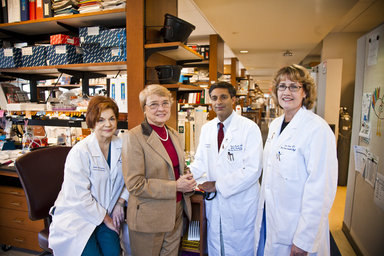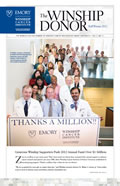Planned Giving Supports Multiple Myeloma Research
Richard and Annelly Deets never planned to target their retirement assets toward cancer research, but Mr. Deets' diagnosis of multiple myeloma redirected their focus and resulted in a generous $400,000 planned giving pledge for multiple myeloma research. Medical oncologist Sagar Lonial and his team have leveraged their support, along with that of other donors, to establish Winship as one of the top multiple myeloma centers in the country.
 |
|
Annelly Deets (center left) pictured with Winship nurses Charise Gleason and Melanie Watson and Dr. Sagar Lonial who were part of the care team for Mrs. Deets' husband, Dick. |
"When my husband was diagnosed with multiple myeloma, we didn't even know what it was," said Mrs. Deets. "We were referred to Winship and began a four-year adventure with Dr. Sagar Lonial and his team, who were all wonderful to us. During treatment, Dick had every side effect you could imagine. It was one crisis after another and the caregivers at Winship handled every one. We could not have asked for kinder treatment. Dick knew he was a difficult patient and thought Dr. Lonial hung the moon for coping with him."
To complicate matters further, Mrs. Deets was diagnosed with a gynecological cancer around the time her husband's treatment options were ending. However, they decided to make their gifts solely to multiple myeloma research.
"There is a lot of funding for women's cancers, but myeloma is a stepchild that few people have even heard about," said Mrs. Deets, who is an active member of Friends of Winship. "Myeloma is being diagnosed earlier now, but there is still a need for clinical trials and drug development. Dick wanted other patients, who are typically much younger than he was, to live to see their children grow up. That's why we decided to give Winship everything we could for myeloma research. Dick also liked the fact that Winship is transparent about how the money is spent.
Remarkable progress has been made against multiple myeloma in the past decade, much of it through ongoing Winship clinical trials aimed at testing new drugs and novel combinations of drugs. Although myeloma is considered a rare cancer, an increased level of research and collaboration across cancer centers is resulting in new treatment options and improved overall survival rates.
"I want people to know that you don't have to have tremendous means to support research at Winship. We are not wealthy people. Our planned gift includes a bequest from Dick's estate and proceeds from my life insurance. And Dick requested donations to Winship's myeloma program instead of flowers for his funeral. Small gifts add up quickly."
"We are very grateful for the Deets' generous gift," said Dr. Lonial, who is a nationally recognized myeloma investigator. "It helps keep our research going at a time when NIH funding is really tight and has provided seed money for developing the data that is absolutely necessary to pursue larger grants, several of which are pending now.
"The Deets' commitment to research is critical for us because we are a rapidly growing new program on the national scene. Their funding allows us to really ratchet up the level of awareness for myeloma research at Winship. One area we're working on is a new target in myeloma called 1433, which has been extensively studied in lung cancer at Emory. We've done some early studies through pilot funding from the Deets to determine the role of 1433 in myeloma and how it impacts sensitivity to the drugs we routinely use to treat high-risk patients."
If you would like to support Winship's Multiple Myeloma Program, contact Ashley Howze at 404-778-1250 or ahowze@emory.edu.


